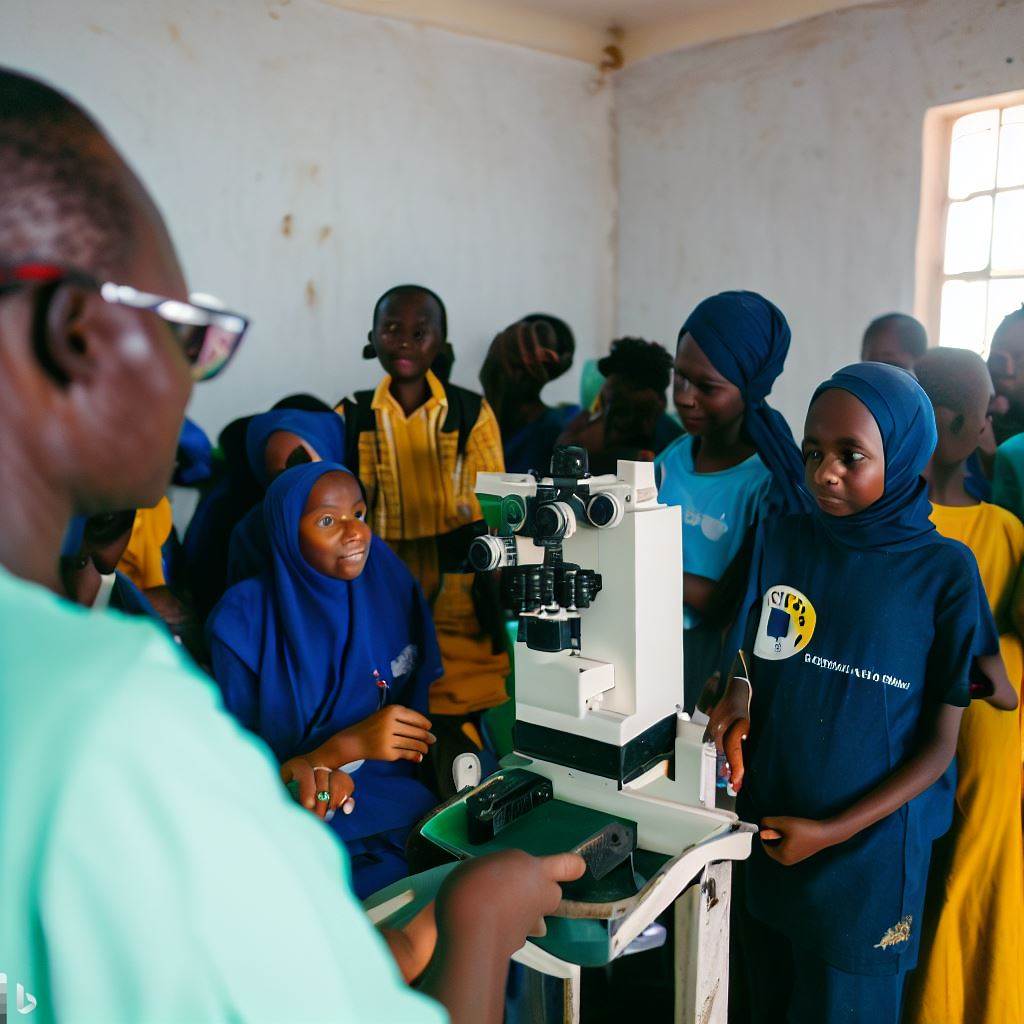Introduction
Optometry is a healthcare profession focused on assessing and managing vision and eye health.
It involves diagnosing and treating visual impairments, prescribing corrective lenses, and providing preventive care.
Vision care outreach programs are crucial in ensuring that individuals, especially those in underprivileged communities, have access to adequate eye care services.
These initiatives help prevent and treat vision problems, improving the quality of life for many.
Vision care outreach programs, including those provided by optometrists, play a vital role in addressing the eye care needs of Nigerians.
The current state of vision care in Nigeria
Vision impairment and blindness stats in Nigeria:
- Nigeria has high rates of vision impairment and blindness, affecting millions.
- World Health Organization reports 4.25 million blind Nigerians, 3.2% of global blindness.
- 16 million Nigerians suffer moderate to severe vision impairment, demanding urgent care.
Challenges in accessing quality vision care:
- Shortage of eye care experts, especially in rural regions, limits access.
- Many lack basic eye exams and affordable corrective solutions, hindering treatment.
- High cost of services like eyeglasses and surgeries excludes most Nigerians.
Impact of poor vision on individuals and communities:
- Individuals struggle in daily life, education, and employment due to poor vision.
- Children’s school performance suffers, affecting future prospects.
- Vision problems strain public health and productivity, fostering economic dependency.
Addressing challenges:
- Expand optometrists and clinics, especially in remote areas.
- Provide affordable services, promote regular eye exams, and early detection.
- Government, NGOs, international groups should collaborate for lasting change.
Result
Prioritizing vision care elevates Nigerian quality of life, empowers generations for brighter futures.
Read: Exploring the Opportunities in Pediatric Optometry in Nigeria
Role of Optometry and Vision Care Outreach
Definition and Scope of Optometry
Optometry is a healthcare profession that focuses on diagnosing, managing, and treating eye conditions and visual disorders.
It involves the examination of the eyes and related structures to determine any abnormalities or vision impairments.
In Nigeria, optometrists play a crucial role in providing primary eye care services to the population.
Read: The Journey to Becoming a Registered Nurse in Nigeria
The Importance of Regular Eye Exams and Vision Correction
Regular eye exams are essential in maintaining good eye health and preventing vision problems.
Early detection of eye conditions, such as cataracts, glaucoma, and macular degeneration, can lead to timely treatment and better outcomes.
Additionally, vision correction, such as prescription eyeglasses or contact lenses, can significantly improve one’s quality of life.
Role of Optometrists in Improving Vision Care Accessibility
Optometrists play a vital role in improving vision care accessibility, especially in underserved areas.
They are trained to provide comprehensive eye examinations, diagnose eye diseases, and prescribe appropriate treatments.
Optometrists work closely with other healthcare professionals, such as ophthalmologists and opticians, to ensure coordinated care.
Optometry and vision care outreach programs are instrumental in reaching remote and marginalized communities.
These programs aim to provide free or affordable eye care services to individuals who may otherwise not have access to them.
By organizing outreach camps, optometrists can conduct vision screenings, distribute eyeglasses, and refer patients for further treatment.
Optometrists involved in outreach activities also educate communities about proper eye care and preventive measures.
They raise awareness about common eye conditions, safety precautions, and the importance of regular eye exams.
This proactive approach helps prevent vision problems and promotes overall eye health within the community.
In addition to providing direct patient care, optometrists contribute to research and public health initiatives.
They participate in studies to understand the prevalence and causes of eye diseases, contributing to evidence-based healthcare.
Optometrists also collaborate with international organizations to advocate for policies that prioritize eye health and vision care accessibility.
Basically, optometry and vision care outreach programs play a pivotal role in Nigeria’s healthcare system.
Optometrists provide essential eye care services to improve accessibility and promote early detection and treatment of eye conditions.
Their involvement in outreach activities and community education fosters better eye health and preventive measures.
Through research and advocacy, optometrists contribute to the overall improvement of vision care in Nigeria.
Read: The Impact of MRI Technology in Nigeria’s Healthcare System

Overview of vision care outreach programs in Nigeria
Government initiatives to address vision care issues
- The Nigerian government has implemented various programs to tackle vision care problems.
- These initiatives aim to provide access to affordable eye care services across the country.
- Government hospitals and primary health centers offer vision care services to the public.
- Efforts have been made to train healthcare professionals to diagnose and treat vision-related conditions.
Non-governmental organizations (NGOs) working in the field of vision care
- Several NGOs in Nigeria are actively involved in providing vision care services.
- These organizations focus on providing free eye screenings and treatment to disadvantaged communities.
- NGOs collaborate with local communities and healthcare providers to increase awareness about eye health.
- They also play a crucial role in distributing free eyeglasses and other visual aids to those in need.
Collaborative efforts with international organizations
- International organizations have partnered with Nigeria to improve vision care outreach.
- These collaborations aim to strengthen infrastructure and enhance training programs.
- International organizations provide funding and expertise to support vision care initiatives in Nigeria.
- Joint efforts focus on improving access to quality eye care services in remote and underserved areas.
In general, Nigeria has made significant strides in vision care outreach through government initiatives, NGO involvement, and collaboration with international organizations.
However, there is still a need for continuous support and efforts to reach all individuals in need of vision care services.
Read: How to Become an MRI Technologist in Nigeria
Challenges and opportunities in vision care outreach in Nigeria
Raising awareness on vision care importance
- Nigerian population lacks knowledge about vital vision care.
- People unaware of common eye conditions, preventive actions, and treatments.
- Ignorance about untreated vision issues’ impact on health and well-being.
Limited resources and infrastructure
- Few eye care pros, clinics for growing populace.
- Insufficient funding for Nigerian vision care initiatives.
- Shortage of equipment, meds, tech for effective care.
Strategies to enhance outreach and overcome challenges
- Educate through campaigns, media, and community involvement.
- Partner with local, global groups for funds, resources.
- Train more eye care experts to bridge gaps.
- Use mobile clinics for remote areas’ care.
- Partner with schools, gov’t for children’s screenings.
- Gather data to prove vision care’s value.
- Advocate for policy change, government support.
- Use telehealth for virtual consultations.
- Integrate vision care into primary healthcare.
- Establish sustainable funding for long-term impact.
By raising awareness, collaborating, training, and leveraging tech, Nigerian vision care can improve.
Read: Career Opportunities for Speech-Language Pathologists in Nigeria
Success stories and impact of vision care outreach in Nigeria
Case studies of individuals benefiting from vision care services
- Ana, a 10-year-old girl, received her first pair of glasses through a vision care outreach program.
- With her improved vision, Ana can now see the blackboard clearly and actively participate in class.
- Before receiving vision care, Ana struggled academically and was often neglected by her classmates.
- Since getting her glasses, Ana’s grades have significantly improved, and she now dreams of becoming a teacher.
Positive outcomes in terms of education, employment, and quality of life
- Vision care outreach programs have played a crucial role in improving educational outcomes in Nigeria.
- Children who previously struggled due to vision problems can now fully engage in their studies.
- With enhanced vision, these students are more likely to complete their education and pursue higher studies.
- Additionally, adults who receive vision care experience improved employment opportunities.
- Clear vision enables individuals to work effectively, leading to increased productivity and economic stability.
- Furthermore, access to vision care positively impacts the overall quality of life for beneficiaries.
- Improved vision helps individuals to carry out daily activities independently and with greater confidence.
- It also fosters social integration, enabling people to participate actively in their communities.
Testimonials from beneficiaries and their families
- One grateful parent, Mr. Adebowale, shares how vision care transformed his son’s life.
- “Before receiving vision care, my son, Ade, struggled in school and had low self-esteem,” Mr. Adebowale said.
- “But since getting his glasses, he has become more confident, his grades have improved, and he has made new friends.”
- Another beneficiary, Mrs. Okonkwo, emphasizes the impact of vision care on employability.
- “I used to find it challenging to find a job due to my poor vision,” Mrs. Okonkwo shared.
- “But after receiving eye care and obtaining glasses, I was able to secure a stable job and support my family.”
- These testimonials highlight the life-changing effect that vision care outreach has on individuals and their families.
- Access to vision care services empowers people to overcome barriers and achieve their full potential.
These success stories, positive outcomes, and heartfelt testimonials underscore the importance of vision care outreach programs in Nigeria.
By providing affordable and accessible eye care services, these programs not only improve educational outcomes but also enhance employment opportunities and overall quality of life.
Through vision care, individuals like Ana, Ade, and Mrs. Okonkwo have been able to overcome vision challenges and experience positive transformations.
It is crucial to continue supporting and expanding such outreach initiatives to reach more underserved communities and make a lasting impact on the lives of Nigerians.
Read: Step-by-step Guide to Becoming a Nursing Assistant in Nigeria
Conclusion
Optometry and vision care outreach is crucial in Nigeria to address the high prevalence of vision impairments and eye diseases.
Through providing access to eye exams, corrective lenses, and treatment, this outreach improves the overall quality of life for individuals.
It is essential for individuals and organizations to join hands and support vision care initiatives in Nigeria.
This can be done through volunteering, donating funds or resources, and raising awareness about the importance of vision care.
With concerted efforts and support, Nigeria has immense potential for improved vision care.
By investing in optometry education, increasing the availability of eye care clinics, and prioritizing public health policies, the country can make significant strides in ensuring better eye health for its population.
Join the movement for better vision care in Nigeria, and together, let’s make a lasting impact on people’s lives!




